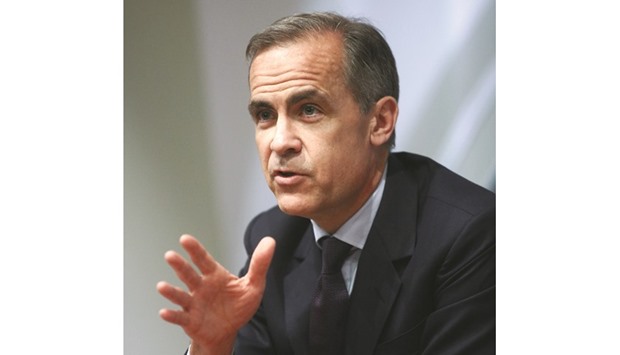Bank of England governor Mark Carney told university graduates in his Canadian hometown that they are entering a more volatile job market where the potential gains from creating new products are greater and many other industries will be wiped out.
Much of the tumult comes from the trauma of the 2008 global financial crisis that has shaken past drivers of economic growth, while new health, energy and financial technologies are rich in opportunity, Carney said in a commencement speech on Tuesday at the University of Alberta in Edmonton.
“Today, those who are blessed with talent and opportunity can reap tremendous rewards,” said Carney, whose father was professor of education at the university. “Gains to success are magnified in the global marketplace. Now is the time to be famous or fortunate.”
Carney’s speech was a homecoming to accept an honorary degree from the school where his father taught and the city where the former Bank of Canada governor grew up before becoming the first ever foreign national to lead the UK central bank. The commencement summed up what lies ahead for the generation following the biggest economic collapse since the Great Depression, and stressed future leaders must return commerce and banking to the service of the public.
“The severity of the financial crisis showed what happens when those responsibilities are not widely held,” Carney said. “Now the best in finance are regaining their sense of purpose by recognising that finance is not an end in itself but a means to promote investment, innovation, growth and prosperity.”
The speech didn’t offer specific commentary on the UK economy, and Carney signalled much work needs to be done to return the world to good health.
“Affect bias, which means an economic form of post-traumatic stress disorder, something that induces consumer and corporate caution, is weighing on global growth. Questions are being raised about the effectiveness of macro-economic policies, the merits of global markets, and even the sustainability of our traditional engines of growth.”
“So I hope you had fun last night,” Carney told the gathering. “Because you can always count on a central banker to kill the buzz.”
The pace of change in the economy, technology and culture is accelerating, meaning the future of some industries is grim, Carney said. “It is entirely unrealistic to map out the decades ahead,” he said. “Many of the jobs and even the industries of today will be gone tomorrow.”
He also said job seekers must be “flexible and adventurous,” citing his own luck as he moved into an unexpected career in central banking. “I should know because it is a total accident of history that I am Governor of the Bank of England. Indeed, there are many in the UK who are still wondering how it happened,” he joked.
Carney began his Bank of Canada job hoping he could “set cruise control and not mess it up,” and instead faced “harrowing years” through the financial crisis. He credited mentors from Bank of Canada governor David Dodge to Mervyn King at the Bank of England and US policy makers Ben Bernanke and Tim Geithner for guidance that helped him and the world through the slump.
He didn’t elaborate on his own future, which is also uncertain. He has said he’ll only decide before the end of the year whether to serve a full eight-year term as BoE governor. When he was appointed, he only committed to stay for five years.
Business and financial leaders need to return their focus to serving the wider public good following an era that was more selfish, Carney said.
“Your generation will determine how well the world commercialises fundamental breakthroughs in areas such as new energy technologies, biotech and fintech”, he said. “And your generation will determine whether we maintain the social capital for shared prosperity consistent with the values of this university and country.”

Carney: Right time.
